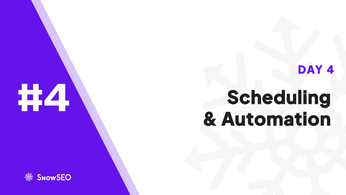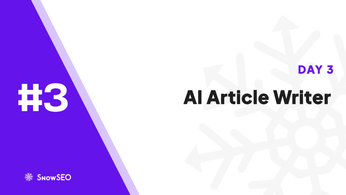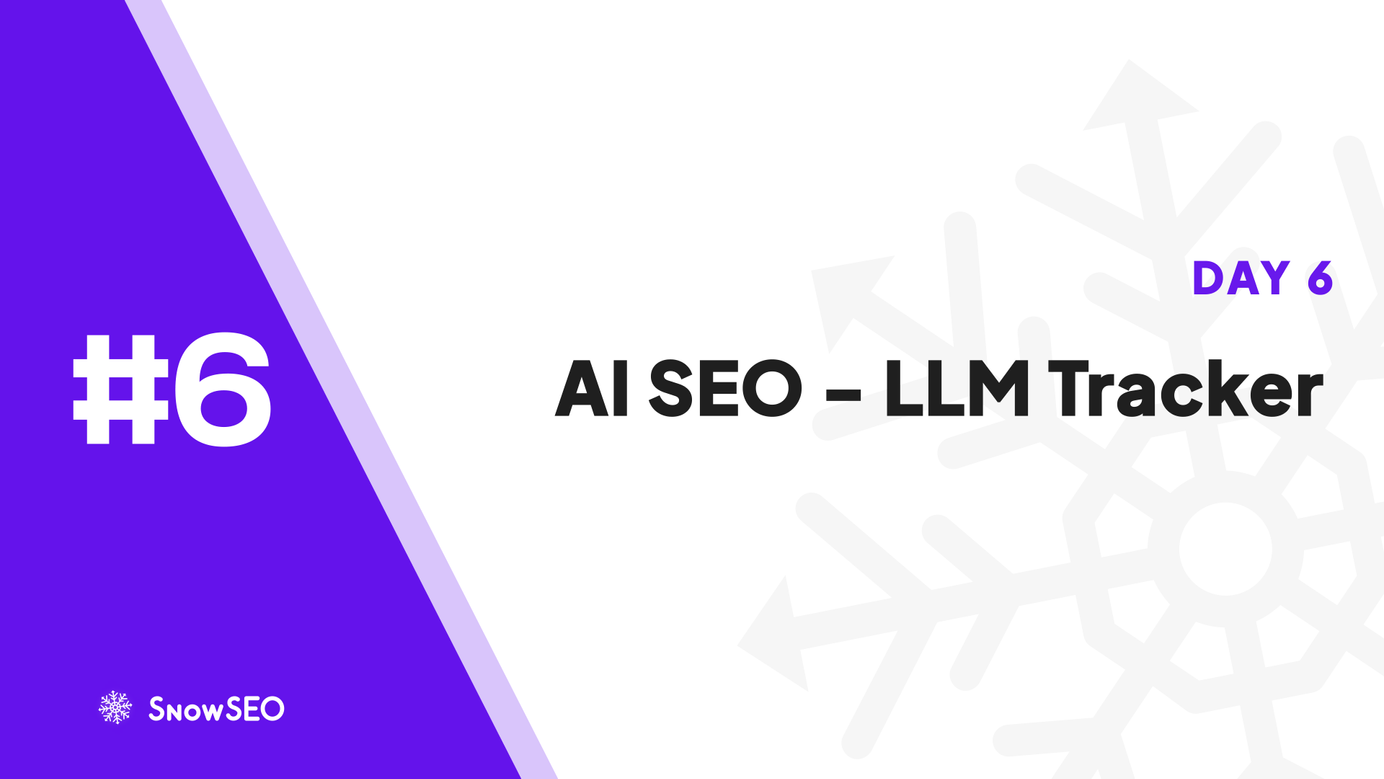
Day 6: AI SEO - LLM Tracker
Preparing for the Future of Search
Table of Contents
Welcome to the final day of SnowSEO 2.0 Launch Week. Over the past five days, we've explored tools that optimize for today's search landscape: keyword research, technical optimization, content creation, workflow automation, and competitive intelligence. Today, we're looking ahead to the future of search with our AI SEO - LLM Tracker.
The search industry is experiencing its most significant transformation since Google's inception. AI-powered search engines like ChatGPT, Claude, Perplexity, and others are changing how people discover information. Traditional search optimization focuses on ranking in Google's results, but the next generation of search optimization requires understanding and optimizing for AI-generated responses.
Our AI SEO - LLM Tracker positions you at the forefront of this evolution, helping you monitor, understand, and optimize your brand's visibility across AI search platforms.
The Shift from Keywords to Conversations
Traditional SEO is built around keywords and web pages. Users type queries, search engines return ranked lists of pages, and SEO professionals optimize to rank higher in those lists. This model has dominated search for over two decades.
AI search represents a fundamental shift from keywords to conversations. Instead of presenting lists of links, AI search engines provide direct answers, recommendations, and explanations. Users ask natural language questions and receive comprehensive responses that synthesize information from multiple sources.
This shift creates new opportunities and challenges for businesses:
Opportunities: Your brand can be mentioned, recommended, or cited directly in AI responses, providing immediate visibility without requiring users to click through to your website.
Challenges: Traditional ranking metrics become less relevant when AI systems synthesize information rather than simply ranking pages. Understanding your visibility requires new measurement approaches.
Understanding AI Search Visibility
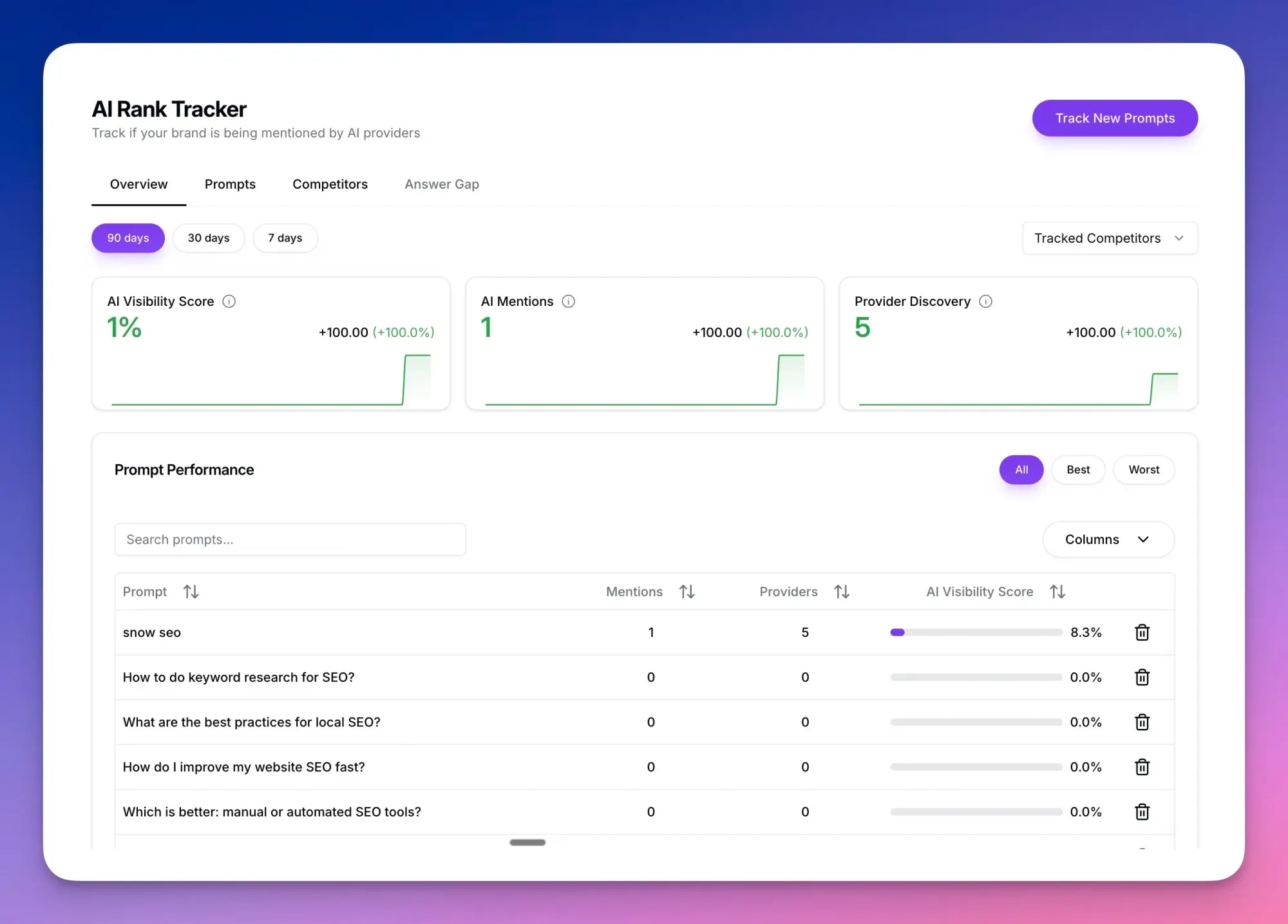
AI search visibility differs fundamentally from traditional search visibility. Instead of tracking rankings for specific keywords, you need to understand how AI systems perceive, process, and present information about your brand.
AI Visibility Score
This comprehensive metric measures your overall presence across AI search platforms. Unlike traditional rankings that focus on individual keywords, the AI Visibility Score considers:
- How frequently AI systems mention your brand across different query types
- The context and sentiment of those mentions
- Your brand's positioning relative to competitors in AI responses
- The authority and credibility AI systems assign to your brand
The score provides a single metric for tracking your AI search performance over time, similar to how domain authority measures traditional SEO strength.
AI Mentions Tracking
AI systems don't just mention brands - they make recommendations, comparisons, and judgments. Understanding these mentions requires analyzing:
Mention Frequency: How often do AI systems include your brand in relevant responses?
Mention Context: Are you mentioned as a leader, alternative, or example? Do mentions focus on strengths or limitations?
Mention Sentiment: How do AI systems characterize your brand? Positive, neutral, or negative framing can significantly impact user perception.
Competitive Positioning: When AI systems compare options, how is your brand positioned relative to competitors?
Provider Discovery Analysis
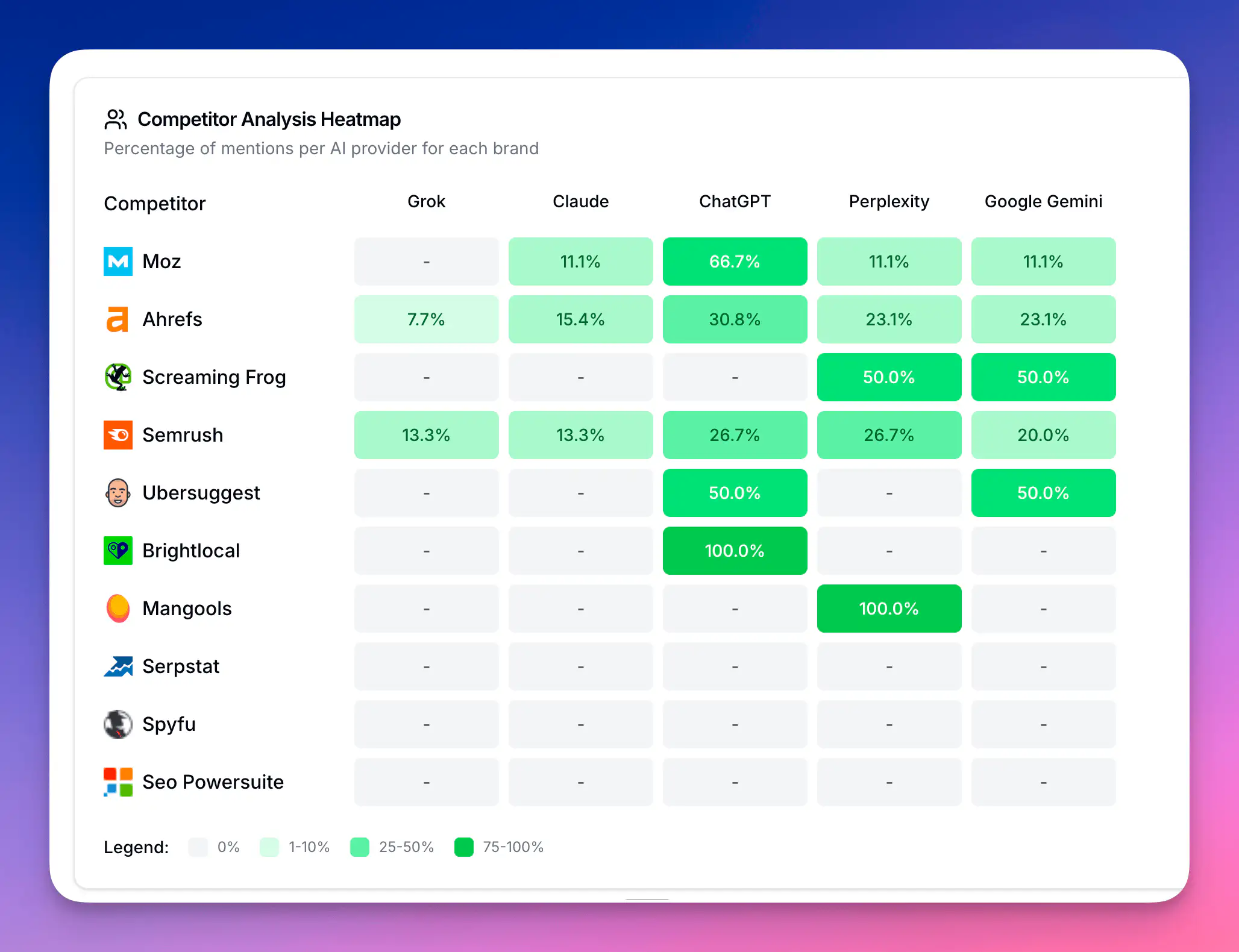
Different AI platforms have different strengths, biases, and information sources. ChatGPT might favor certain types of content, while Claude might prioritize different authority signals. Understanding these differences allows you to optimize for each platform's specific characteristics.
Our system tracks performance across major AI providers:
- OpenAI's ChatGPT and GPT-4
- Anthropic's Claude
- Google's Bard and Gemini
- Perplexity AI
- Microsoft's Copilot
- Grok
- Emerging AI search platforms
This analysis reveals which platforms are most likely to recommend your brand and where optimization efforts should focus.
Competitive Brand Visibility Analysis
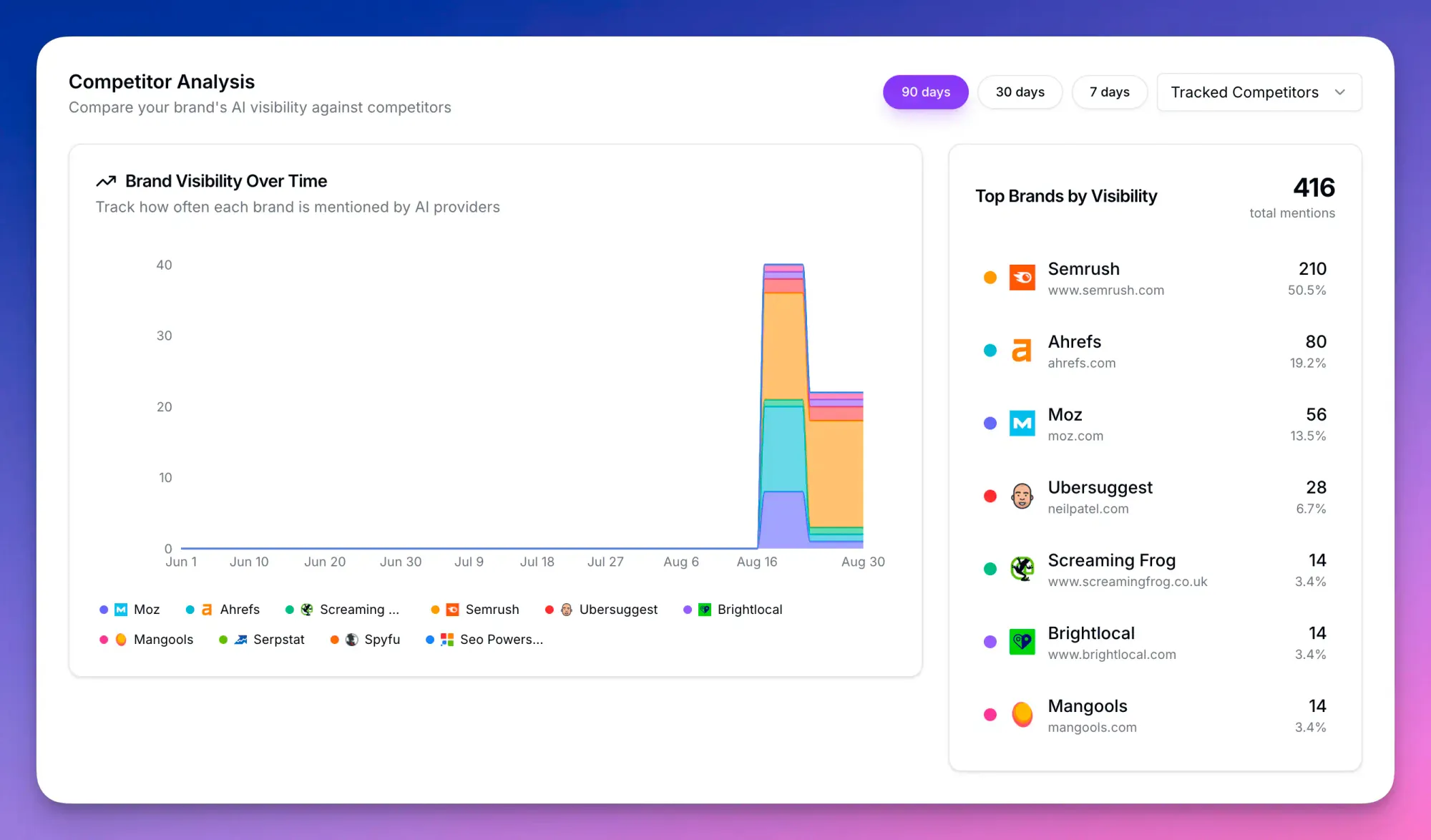
One of the most powerful features of our AI SEO tracker is comprehensive competitive analysis that shows exactly how your brand performs against competitors across different AI platforms.
Brand Visibility Over Time: Track how often each brand in your competitive set gets mentioned by AI providers over time. This reveals which competitors are gaining or losing AI search visibility and helps identify trends before they become obvious to the broader market.
Top Brands by Visibility Rankings: See exactly how you stack up against competitors with total mention counts and percentage breakdowns. For example, in the SEO tools space, you might see Semrush dominating with 50.5% of total mentions, followed by Ahrefs at 19.2%, and Moz at 13.5%. This data helps you understand your current market position and set realistic improvement targets.
Cross-Platform Performance Heatmap: The most sophisticated feature provides a detailed breakdown of how each competitor performs across different AI providers. This heatmap reveals crucial strategic insights:
- Which competitors dominate specific AI platforms (e.g., Moz showing 66.7% visibility on ChatGPT while only 11.1% on other platforms)
- Platform-specific optimization opportunities (e.g., if Screaming Frog shows 50% visibility on Perplexity and Google Gemini but 0% elsewhere, there's a clear pattern to analyze)
- Competitive gaps where no brand has strong visibility, indicating opportunity spaces
This granular analysis helps you understand not just where you stand overall, but exactly which AI platforms represent your biggest opportunities and threats.
Strategic AI Search Optimization
Optimizing for AI search requires different strategies than traditional SEO. AI systems evaluate authority, accuracy, and relevance through their own criteria, which may not align with traditional search ranking factors.
Content Gap Identification
AI systems excel at identifying missing information. If an AI can't find comprehensive, authoritative information about your brand, products, or expertise areas, it may mention competitors instead or provide incomplete responses.
Our content gap identification analyzes:
Information Completeness: What essential information about your brand is missing from AI training data or accessible sources?
Authority Signals: What credentials, achievements, or recognition might strengthen AI perception of your expertise?
Comparison Context: What information do AI systems use when comparing you to competitors, and where might additional context be valuable?
Use Case Coverage: Do AI systems understand the full range of problems your products or services solve?
Answer Gap Analysis
This represents one of the most significant opportunities in AI search optimization. When AI systems provide incomplete, outdated, or inaccurate answers to questions in your expertise area, you can create authoritative content that improves those responses.
The process involves:
- Identifying Incomplete Responses: Finding queries where AI systems provide partial or unsatisfactory answers
- Creating Comprehensive Resources: Developing authoritative content that addresses these gaps
- Optimizing for AI Consumption: Structuring content in ways that AI systems can easily understand and reference
- Monitoring Response Improvements: Tracking how your content influences AI responses over time
Prompt Performance Optimization
Unlike traditional keywords, AI search optimization requires understanding natural language patterns and conversation flows. Different ways of asking similar questions can produce dramatically different results.
Our prompt performance tracking analyzes:
Query Variations: How do different phrasings of similar questions affect your brand's visibility?
Context Sensitivity: How do AI responses change based on conversation context or follow-up questions?
Intent Matching: Which types of user intents are most likely to generate mentions of your brand?
Response Positioning: Where does your brand typically appear in AI responses - as the primary recommendation, an alternative, or an example?
Real-World Application: AI Search Optimization Strategy
To illustrate how AI search optimization works in practice, consider how one of our clients, a B2B software company, approached this new landscape:
Traditional SEO Performance: They ranked well for product-related keywords and had strong organic traffic, but noticed increasing numbers of users were asking AI systems for software recommendations instead of searching Google.
AI Visibility Assessment: Our initial analysis revealed:
- Low AI Visibility Score (15%) compared to competitors
- Infrequent mentions in AI responses about their software category
- When mentioned, positioned as a "smaller alternative" rather than a leader
- Missing from AI responses to specific use case questions
Strategic Response Development:
- Comprehensive Information Architecture: Created detailed, structured content about their product capabilities, use cases, and competitive advantages
- Authority Building: Developed thought leadership content demonstrating expertise in their industry
- Use Case Documentation: Created specific resources addressing the exact scenarios users ask AI systems about
- Competitive Positioning: Developed content that clearly articulates their unique value proposition
Content Optimization for AI:
- Structured content with clear headings and logical information hierarchy
- Included specific metrics, case studies, and concrete examples
- Created FAQ sections addressing common AI queries
- Developed comparison content that positioned them favorably
Results After 120 Days:
- AI Visibility Score increased to 67%
- Brand mentions in relevant AI responses increased by 340%
- Positioning improved from "alternative" to "recommended option" in 73% of relevant queries
- Began appearing in AI responses for broader industry questions beyond just product queries
The key insight was that AI search optimization requires creating content specifically designed to help AI systems understand and accurately represent your brand, rather than simply optimizing for traditional search engines.
Technical Considerations for AI Optimization
AI search optimization involves several technical considerations that differ from traditional SEO:
Structured Information Architecture
AI systems excel at processing well-organized, clearly structured information. This means:
Clear Hierarchies: Information should be organized with logical headings and subheadings that AI systems can easily parse.
Factual Clarity: Claims should be specific, verifiable, and supported with evidence rather than marketing language.
Contextual Completeness: Each piece of content should provide sufficient context for AI systems to understand its relevance and authority.
Cross-Reference Networks: Internal linking and content relationships help AI systems understand the scope and depth of your expertise.
Authority and Credibility Signals
AI systems evaluate credibility differently than traditional search engines. Important factors include:
Expertise Indicators: Clear demonstration of qualifications, experience, and knowledge in your field.
External Validation: Recognition from industry bodies, media coverage, and third-party endorsements.
Factual Accuracy: Consistent, accurate information across all content and sources.
Source Attribution: Proper citation and attribution of claims and data points.
Accessibility and Discoverability
Making content accessible to AI systems requires:
Multiple Format Availability: Information should be available in various formats (text, structured data, multimedia descriptions).
Public Accessibility: AI systems typically cannot access gated content, so key information should be publicly available.
Update Frequency: Regular content updates help ensure AI systems have current information.
Semantic Clarity: Content should use clear, unambiguous language that AI systems can accurately interpret.
Integration with Traditional SEO Strategy
AI search optimization doesn't replace traditional SEO - it augments it. The most effective approach integrates both strategies:
Keyword Research Enhancement
Traditional keyword research reveals what people search for, while AI search optimization reveals what they ask about. Combining these insights provides a comprehensive understanding of user intent and information needs.
Content Strategy Amplification
Content created for traditional SEO can be enhanced for AI consumption through:
- Adding structured data and clear information architecture
- Including comprehensive FAQ sections
- Providing specific examples and use cases
- Creating supporting content that provides broader context
Authority Building Synergy
Traditional link building and AI authority building often reinforce each other:
- High-quality backlinks signal authority to both search engines and AI systems
- Content that earns links is often the same content that AI systems find authoritative
- Industry recognition valuable for traditional SEO also improves AI credibility assessment
Common Misconceptions About AI Search Optimization
Several misconceptions can limit the effectiveness of AI search optimization efforts:
"AI Search Will Replace Traditional Search"
While AI search is growing rapidly, traditional search engines aren't disappearing. Users still need to discover websites, research products, and find specific information. The most effective strategy optimizes for both traditional and AI search.
"Optimizing for AI Is Just About Creating More Content"
AI search optimization is more about content quality and structure than quantity. AI systems prioritize authoritative, accurate, well-organized information over volume.
"AI Systems Are Neutral and Unbiased"
AI systems reflect the biases present in their training data and design. Understanding these biases and optimizing accordingly is part of effective AI search strategy.
"AI Search Optimization Results Are Immediate"
Like traditional SEO, AI search optimization takes time. AI systems update their understanding gradually, and visibility improvements typically occur over months rather than weeks.
Measuring AI Search Success
Traditional SEO metrics don't fully capture AI search performance. New measurement approaches include:
Visibility Metrics
- AI Visibility Score trends over time
- Share of voice in AI responses for relevant topics
- Mention frequency across different AI platforms
Quality Metrics
- Sentiment analysis of AI mentions
- Positioning analysis (primary recommendation vs. alternative)
- Accuracy of AI-generated information about your brand
Competitive Metrics
- Comparative visibility versus competitors
- Market share of AI mentions in your category
- Competitive positioning in AI responses
Business Impact Metrics
- Brand awareness changes in target markets
- Lead quality and conversion from AI-influenced users
- Customer acquisition cost changes as AI search adoption grows
The Future of Search Optimization
AI search represents the beginning of a broader transformation in how people access information. Several trends will likely accelerate:
Multimodal Search: AI systems will increasingly process and respond with text, images, audio, and video.
Personalized Responses: AI systems will tailor responses based on user preferences and behavior.
Real-Time Information Integration: AI systems will incorporate more current information and real-time data.
Specialized AI Assistants: Industry-specific AI systems will emerge with deep domain expertise.
Voice and Conversational Interfaces: More searches will happen through voice assistants and conversational AI.
Businesses that begin optimizing for AI search now will have significant advantages as these trends accelerate.
Getting Started with AI Search Optimization
AI search optimization should be approached systematically:
Assessment Phase
- Evaluate your current AI visibility across major platforms
- Analyze competitor AI search performance
- Identify content gaps and optimization opportunities
Strategy Development
- Define AI search objectives aligned with business goals
- Prioritize optimization efforts based on impact and resources
- Develop content and optimization roadmap
Implementation
- Create or enhance content optimized for AI consumption
- Structure information for maximum AI accessibility
- Build authority signals valued by AI systems
Monitoring and Optimization
- Track AI visibility metrics and trends
- Monitor competitor AI search performance
- Continuously optimize based on performance data
The Complete SnowSEO 2.0 Platform
The AI SEO - LLM Tracker completes the SnowSEO 2.0 platform, providing comprehensive search optimization capabilities:
- Day 1: Enhanced Keyword Research for discovering opportunities
- Day 2: Website Auditor & Rank Tracker for technical optimization and performance monitoring
- Day 3: AI Article Writer for creating optimized content at scale
- Day 4: Scheduling & Automation for systematic execution
- Day 5: Competitor Tracker for strategic market intelligence
- Day 6: AI SEO - LLM Tracker for future-ready optimization
Together, these tools provide end-to-end search optimization capabilities for both current and emerging search landscapes.
Preparing for Search's Next Chapter
The evolution from keyword-based search to AI-powered conversations represents the most significant change in search since the internet's early days. Businesses that understand and adapt to this change will gain substantial competitive advantages.
AI search optimization isn't about abandoning traditional SEO - it's about expanding your optimization strategy to include the platforms and technologies that will define search's future. The principles remain similar: provide valuable, authoritative information that helps users accomplish their goals. The techniques and metrics are what's evolving.
SnowSEO 2.0's AI SEO - LLM Tracker positions you at the forefront of this evolution, providing the tools and insights needed to succeed as search continues to transform.
Thank you for following SnowSEO 2.0 Launch Week. The future of search optimization is here, and we're excited to help you navigate it successfully.
Questions about AI search optimization or implementing any of the SnowSEO 2.0 features? Our team is here to help you develop a comprehensive search strategy for today's landscape and tomorrow's opportunities.
ps. SnowSEO 2.0 will be officially live from 1st Sept, 2025.



